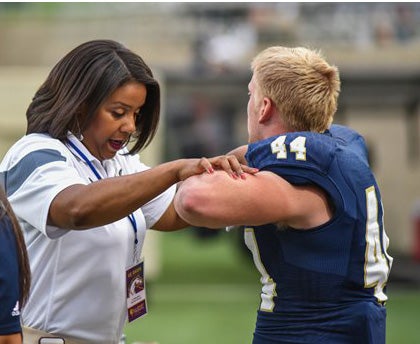Coaches and team physicians at all levels of sports will soon be able to test athletes for possible concussions using low-cost, mobile tools being developed at UC Davis.
Concussion Symptoms
- Blurred vision
- Eye strain
- Double vision
- Light sensitivity
- Pupil abnormalities
- Eye movement abnormalities
- Visual attention deficits
Comprehensive treatment for traumatic brain injury
UC Davis experts in physical medicine and rehabilitation, sports medicine and neuropsychology provide complete care for all forms of traumatic brain injury from mild to severe. Treatment plans are personalized based on the causes of the injury and specific symptoms. Call 916-734-6805 for information about sports-related TBI (including concussion) treatment and return-to-play evaluations and 916-734-7041 for information on non-sports-related TBI evaluation and treatment.
Khizer Khaderi, director of neuro-ophthalmology at the UC Davis Eye Center, has found a way to more objectively determine the likelihood of a concussion by measuring how athletes’ eyes react to specific tests that assess the eye-brain connection.
“This is what I consider groundbreaking research,” says Melita Moore, head team physician for UC Davis Athletics and assistant clinical professor of orthopaedic surgery. “Right now, whatever an athlete tells me is what I have to go on with regard to concussion, because you cannot see concussion.”
Moore is the principal investigator of a study that began this fall on the UC Davis football field. She is using the device to test athletes immediately after a sports injury and assess how their brain function compares to established norms.
Returning to play too soon creates risks
Returning to play too soon after a concussion creates risk of more serious injury or even sudden death. Currently, athletic trainers, physicians and professionals try to detect brain injury in players by having them take balance and cognitive tests prior to the start of the sport season, and then give the same tests at the time of injury. If the player performs poorly compared to his baseline test, then a concussion is suspected.
But existing tests are inadequate because a concussion diagnosis still relies partly on the self-reporting of players who may want to return to the game. They can fudge the results by purposely delivering a poor baseline test so that when an injury occurs, their results aren’t too different from their baseline scores.
“Therein lies a really big problem, because you’re going to get people who are really hurt, but they’re competitors, and they want to go out there, but it may not be safe to do so,” Khaderi says. “Returning to play too soon after a concussion increases the risk of more serious injury and even sudden death from rapid brain swelling if the first concussion hasn’t had time to heal.”

Tool measures eye tracking, pupil dilation, brain waves
Khaderi and his team have identified three tests that will run on a laptop or tablet platform and can greatly increase chances of accurate on-field assessment. One test gauges eye movement — which often slows after brain injury — and compares it against a baseline that’s harder for players to intentionally throw.
Another test measures pupil dilation and function via responses to image-driven psychological tests, rather than by classic flashlight-in-the-eyes techniques that can be skewed by background light. A third metric in the works measures brain waves, or electroencephalograms.
“I wanted to create something that was cheat-proof. And to do that, I focused on eye movements and pupil response — physiologic processes that you can’t cheat,” Khaderi says.
Packaged as cloud-based software application
Measuring eye movement can be accomplished with a $100 eye-track instrument and a laptop or tablet. Khaderi says he hopes to package this test in a cloud-based software application, making it accessible to coaches and team physicians at all levels of play.
“We wanted to keep this as cheap as possible in terms of making sure that we can get it into the hands of the people that need it,” he adds.
Related Story
“Having been around children, and having nieces and nephews that play a lot of sports … this is a concern that’s near and dear to my heart,” Khaderi says. “I just want to help provide a solution that can allow them and myself to play sports, and to enjoy all the positive benefits of it, but to feel safe about it.”
Read the original UC Davis Health System story.